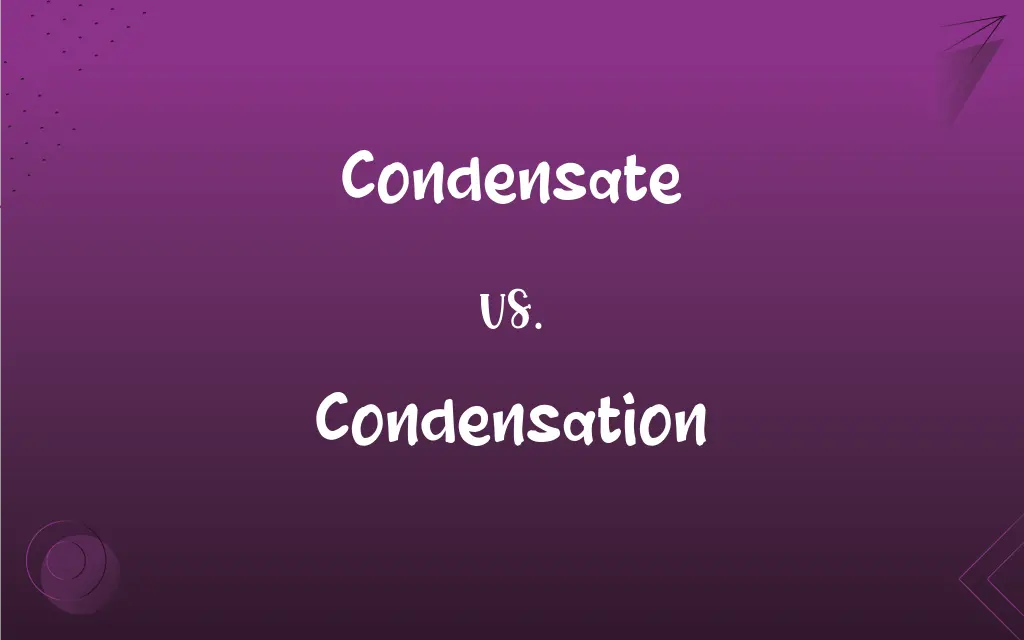Condensate vs. Condensation: What's the Difference?
By Harlon Moss & Janet White || Updated on May 20, 2024
Condensate is the liquid formed when a gas cools and changes state, while condensation is the process of this gas-to-liquid transformation.

Key Differences
Condensate refers to the liquid that forms when a gas undergoes cooling and changes into a liquid state. This term is often used in industrial and HVAC contexts, where it is common to deal with the collection and management of such liquids. Condensation, on the other hand, is the process by which a gas turns into a liquid. This process occurs when gas cools to its dew point or comes into contact with a cooler surface. Condensation is a fundamental part of the water cycle and is responsible for phenomena such as dew, fog, and the formation of clouds.
Condensate is a byproduct of condensation. For instance, the water droplets that form on the outside of a cold glass on a hot day are condensate, resulting from the condensation of water vapor in the air.
In industrial settings, condensate often refers to liquids like water or hydrocarbons that result from the condensation process within equipment like boilers, cooling towers, or natural gas processing plants. Condensation, however, is the broader term that describes the phase change from gas to liquid, applicable in both natural and artificial environments.
While condensate is a tangible product collected and sometimes utilized, such as in steam systems or natural gas extraction, condensation is the descriptive term for the ongoing physical process leading to the formation of condensate.
Comparison Chart
Definition
Liquid formed from cooled gas
Process of gas turning into liquid
ADVERTISEMENT
Occurrence
Result of condensation
Physical phase change process
Common Examples
Water droplets, hydrocarbon liquids
Dew formation, cloud formation
Industrial Relevance
Collected in HVAC, steam systems, natural gas processing
Describes phase change in various systems
Relationship
Byproduct of condensation
Leads to formation of condensate
Condensate and Condensation Definitions
Condensate
Liquid formed from cooled gas.
The air conditioner produces condensate as it cools the air.
ADVERTISEMENT
Condensation
Happens naturally and in industrial settings.
Condensation is a critical process in refrigeration.
Condensate
Collected in HVAC systems.
The HVAC system's drip pan catches the condensate.
Condensation
A key part of the water cycle.
Condensation in the atmosphere forms clouds.
Condensate
Water or hydrocarbon liquid in industrial processes.
The refinery captures condensate from the gas stream.
Condensation
Responsible for dew and cloud formation.
Condensation leads to dew on the grass in the morning.
Condensate
Byproduct of condensation.
The condensate collected on the window overnight.
Condensation
The act of condensing.
Condensate
Often managed and removed to prevent damage.
Proper drainage is needed to remove condensate from the system.
Condensation
The state of being condensed.
Condensate
The liquid resulting from condensation of a gas, such as a product of distillation or another method of separation.
Condensation
An abridgment or shortening of something, especially of a written work or speech.
Condensate
The part of a natural gas mixture that consists of volatile hydrocarbons and can be easily condensed.
Condensation
The process by which a gas or vapor changes to a liquid.
Condensate
(physics) A liquid that is the product of condensation of a gas, i.e. of steam.
Condensation
The liquid so formed.
Condensate
(chemistry) The product of a condensation reaction.
Condensation
(Chemistry) A chemical reaction in which water or another simple substance is released by the combination of two or more molecules.
Condensate
(physics) Any of various condensed quantum states.
Condensation
(Psychology) In psychoanalytic theory, the process by which a single symbol or word is associated with the emotional content of several, not necessarily related, ideas, feelings, memories, or impulses, especially as expressed in dreams.
Condensate
To condense.
Condensation
The act or process of condensing or of being condensed
Condensate
(obsolete) Made dense; condensed.
Condensation
The state of being condensed.
Condensate
Made dense; condensed.
Water . . . thickened or condensate.
Condensation
(physics) The conversion of a gas to a liquid.
Condensate
To condense.
Condensation
The condensate so formed.
Condensate
Atmospheric moisture that has condensed because of cold
Condensation
(chemistry) The reaction of two substances with the simultaneous loss of water or other small molecule.
Dehydration synthesis
Condensation
(psychology) when a single idea (an image, memory, or thought) or dream object stands for several associations and ideas.
Condensation
The act or process of condensing or of being condensed; the state of being condensed.
He [Goldsmith] was a great and perhaps an unequaled master of the arts of selection and condensation.
Condensation
The act or process of reducing, by depression of temperature or increase of pressure, etc., to another and denser form, as gas to the condition of a liquid or steam to water.
Condensation
A rearrangement or concentration of the different constituents of one or more substances into a distinct and definite compound of greater complexity and molecular weight, often resulting in an increase of density, as the condensation of oxygen into ozone, or of acetone into mesitylene.
Condensation
(psychoanalysis) an unconscious process whereby two ideas or images combine into a single symbol; especially in dreams
Condensation
The process of changing from a gaseous to a liquid or solid state
Condensation
Atmospheric moisture that has condensed because of cold
Condensation
The process or result of becoming smaller or pressed together;
The contraction of a gas on cooling
Condensation
A shortened version of a written work
Condensation
The act of increasing the density of something
Condensation
Process of gas turning into liquid.
Condensation formed on the outside of the cold bottle.
Condensation
Occurs when gas cools to its dew point.
Condensation happens when warm, moist air hits a cool surface.
FAQs
What is condensate?
Condensate is the liquid formed when a gas cools and changes into a liquid state.
Can condensate be used for anything?
Yes, condensate can be collected and used in various industrial processes, such as in steam systems.
What is condensation?
Condensation is the process of a gas turning into a liquid.
What role does condensate play in HVAC systems?
In HVAC systems, condensate is collected and drained to maintain system efficiency and prevent damage.
Where does condensation commonly occur?
Condensation occurs on surfaces cooler than the surrounding gas, like windows or cold drinks.
Is condensation the same as precipitation?
No, condensation is the formation of liquid from gas, while precipitation is the falling of that liquid from clouds to the ground.
What is the dew point in relation to condensation?
The dew point is the temperature at which condensation occurs as the air becomes saturated with moisture.
How is condensate formed?
Condensate forms as a result of the condensation process when gas cools to its dew point.
What are common examples of condensation?
Dew on grass, fog, and water droplets on a cold glass are common examples of condensation.
Is condensate only water?
No, condensate can include other liquids like hydrocarbons, depending on the gas that condenses.
How is condensation important in the water cycle?
Condensation forms clouds, which eventually lead to precipitation.
Does condensation occur indoors?
Yes, condensation can occur indoors, especially on windows and walls in humid environments.
How can condensation be controlled?
Condensation can be controlled by reducing humidity and using insulation to keep surfaces warm.
Why is condensate management important?
Proper condensate management prevents water damage and maintains system efficiency.
Can condensate cause problems?
Yes, if not properly drained, condensate can cause water damage and mold growth.
What tools are used to manage condensate?
Drip pans, condensate pumps, and proper drainage systems are commonly used to manage condensate.
Can you see condensation?
Yes, condensation is visible as water droplets on surfaces.
Does condensation only involve water vapor?
No, condensation can involve other gases, leading to different types of condensate.
How does condensation affect energy efficiency?
Excess condensation can reduce the efficiency of HVAC systems if not properly managed.
What industries deal with condensate?
Industries like HVAC, natural gas processing, and power generation frequently deal with condensate.
About Author
Written by
Harlon MossHarlon is a seasoned quality moderator and accomplished content writer for Difference Wiki. An alumnus of the prestigious University of California, he earned his degree in Computer Science. Leveraging his academic background, Harlon brings a meticulous and informed perspective to his work, ensuring content accuracy and excellence.
Co-written by
Janet WhiteJanet White has been an esteemed writer and blogger for Difference Wiki. Holding a Master's degree in Science and Medical Journalism from the prestigious Boston University, she has consistently demonstrated her expertise and passion for her field. When she's not immersed in her work, Janet relishes her time exercising, delving into a good book, and cherishing moments with friends and family.
































































